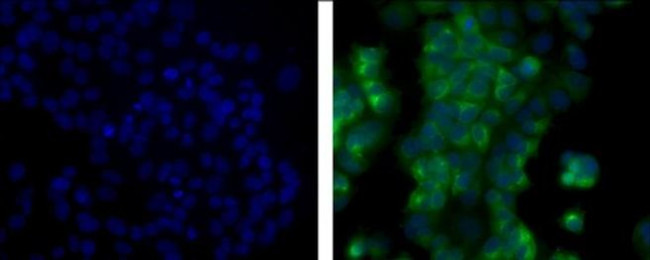Search Thermo Fisher Scientific
Invitrogen
CD227 (Mucin 1) Monoclonal Antibody (SM3), Alexa Fluor™ 488, eBioscience™
Product Details
53-9893-82
Species Reactivity
Host/Isotype
Recommended Isotype Control
Class
Type
Clone
Conjugate
Excitation/Emission Max
Form
Concentration
Purification
Storage buffer
Contains
Storage conditions
Shipping conditions
RRID
Product Specific Information
Description: This SM3 monoclonal antibody reacts with the under-glycosylated form of human Mucin 1 (MUC1, CD227), a large glycoprotein belonging to the mucin protein family. Mucin 1 contains a polypeptide core consisting of multiple tandem repeats that become highly glycosylated. Mucin 1 is typically expressed in ductal or glandular epithelial cells and is localized to the apical membrane. In cancerous cells, Mucin 1 expression is increased and membrane-specific localization is lost resulting in expression throughout the membrane and cytoplasm. High levels of under-glycosylated Mucin 1 are thought to affect cell behavior during both invasion and metastasis as well as in immune recognition. In addition, under-glycosylated Mucin 1 is shed from the epithelial cell surface and can be detected in circulation. Alterations in Mucin 1 glycosylation are found in most adenocarcinomas of the breast, lung, pancreas, prostate, and ovary. Mucin 1 has recently been shown to co-localize and interact with members of the erbB receptor kinase family, proteins that are upregulated in more aggressive forms of breast cancer.
Please note this antibody sees a distinct epitope from other Mucin 1 antibodies.
Applications Reported: This SM3 antibody has been reported for use in flow cytometric analysis and immunocytochemistry.
Applications Tested: This SM3 antibody has been tested by flow cytometry and can be used at less than or equal to 1 µg/mL. This SM3 antibody has also been tested by immunocytochemistry on methanol fixed MCF7 cells and can be used at less than or equal to 20 µg/mL. It is recommended that the antibody be carefully titrated for optimal performance in the assay of interest.
Excitation: 488 nm; Emission: 519 nm; Laser: Blue Laser.
Filtration: 0.2 µm post-manufacturing filtered.
Target Information
MUC1 (Mucin 1, Episialin, MAM-6, CA 15-3, PEM and EMA) is a large cell surface mucin glycoprotein expressed by most glandular and ductal epithelial cells and some hematopoietic cell lineages. MUC1 is a transmembrane glycoprotein with a large mucin-like extracellular domain that matures through several intermediate forms generated by proteolysis, and sequential addition and processing of numerous O-linked glycans that are heavily sialylated. MUC1 is highly polymorphic and each allele encodes a product that contains a different number of repeats (between 30 and 90) leading to large differences in molecular weight of the protein. MUC1 is expressed on most secretory epithelium, including mammary gland and some hematopoietic cells, and is expressed abundantly in >90% breast carcinomas and metastases. Transgenic MUC1 has been shown to associate with all four cebB receptors and localize with erbB1 (EGFR) in lactating glands. The MUC1 gene contains seven exons and produces several different alternatively spliced variants. Overexpression, aberrant intracellular localization, and changes in glycosylation of the MUC1 protein have been associated with carcinomas. Multiple alternatively spliced transcript variants that encode different isoforms of the MUC1 gene have been reported, but the full-length nature of only some has been determined. Transgenic MUC-1 has been shown to associate with all four cebB receptors and localize with erbB1 (EGFR) in lactating glands.
For Research Use Only. Not for use in diagnostic procedures. Not for resale without express authorization.
How to use the Panel Builder
Watch the video to learn how to use the Invitrogen Flow Cytometry Panel Builder to build your next flow cytometry panel in 5 easy steps.
References (0)
Bioinformatics
Protein Aliases: Breast carcinoma-associated antigen DF3; CA 15-3; Cancer antigen 15-3; Carcinoma-associated mucin; CD227; DF3 antigen; EMA; Episialin; H23 antigen; H23AG; J19; KL-6; Krebs von den Lungen-6; Medullary cystic kidney disease, autosomal dominant; MUC-1; MUC1-alpha; mucin 1, transmembrane; Mucin-1; Peanut-reactive urinary mucin; PEM; PEMT; Polymorphic epithelial mucin; PUM; tumor associated epithelial mucin; Tumor-associated epithelial membrane antigen; Tumor-associated mucin
Gene Aliases: ADMCKD; ADMCKD1; CA 15-3; CD227; EMA; H23AG; KL-6; MAM6; MCD; MCKD; MCKD1; MUC-1; MUC-1/SEC; MUC-1/X; MUC1; MUC1/ZD; PEM; PEMT; PUM
UniProt ID: (Human) P15941
Entrez Gene ID: (Human) 4582

Performance Guarantee
If an Invitrogen™ antibody doesn't perform as described on our website or datasheet,we'll replace the product at no cost to you, or provide you with a credit for a future purchase.*
Learn more
We're here to help
Get expert recommendations for common problems or connect directly with an on staff expert for technical assistance related to applications, equipment and general product use.
Contact tech support


